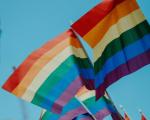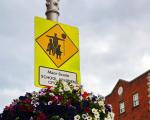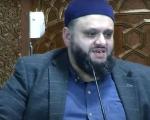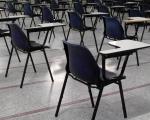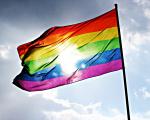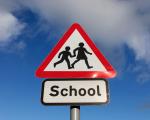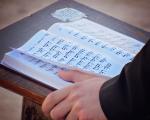Transport to faith schools
Discrimination on grounds of religion and belief is prominent in the provision of both discretionary and statutory home to school transport. We seek equitable school transport policies, free from religious privilege, fair to all families and fair to taxpayers.
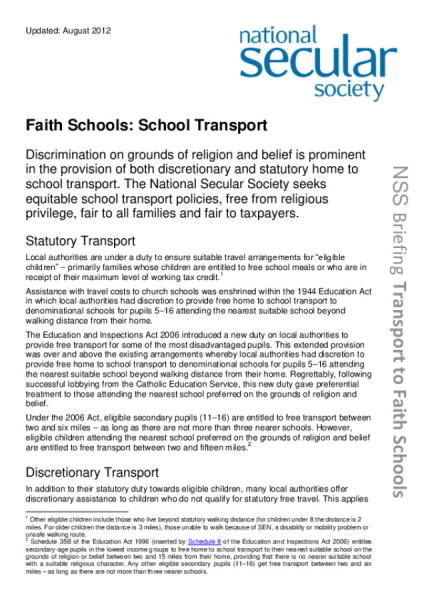 Faith Schools Transport Briefing Paper (PDF, 222 Kb)
Faith Schools Transport Briefing Paper (PDF, 222 Kb)
Related news
A third of teachers say faith a ‘barrier’ to discussing LGBT issues
Posted: Wed, 22 Feb 2023 15:50
One in three teachers says faith acts as a 'barrier' to discussing LGBT+ topics in school, a new survey has revealed.
Amongst those who work at faith schools, the number increased to almost half, with 46% feeling that faith impeded their ability to engage in open discussions.
The research, which was carried out for LGBT+ young people's charity Just Like Us, also found primary school teachers were more likely to feel such barriers existed in comparison to secondary school teachers.
Separately, new polling by teachers' union NASWUT found over half of LGBT+ teachers have experienced discrimination and abuse from pupils and parents.
A further one in four reported that such abuse had worsened in the last three years, rather than improving.
Only 33% reported that their school has a zero-tolerance approach to LGBT+ discrimination, with just 14% saying their school provided training to senior management on LGBT+ equality.
NASWUT called upon the government to implement several measures, including mandatory training for schools and college leaders, the required publication of LGBT+ equality action plans by schools, and for inspection systems which challenge schools' records on "advancing equality" for both teachers and students.
In 2018, National Secular Society research found more than three-quarters of state-funded secondary faith schools in England were failing to teach Relationships and Sex Education (RSE) impartially.
Out of 600 state secondary schools, 77% were found to be teaching the subject in accordance with religious scripture.
Many faith schools explicitly promoted the view that same-sex relationships were morally wrong.
Government guidance on RSE indicates schools must teach about LGBT relationships, in order to comply with the Equality Act 2010. However, the same guidance states faith schools, including those which are state funded, "may teach the distinctive faith perspective on relationships".
Schools without a religious character have also frequently come under pressure from religious lobbying groups opposed to teaching about same-sex relationships.
One such group, the anti-LGBT Muslim organisation Parents United, recently hosted a conference where speakers told attendees gay children must be taught to 'repent'.
It had previously complained about including same-sex relationships in RSE lessons and called for "faith-sensitive" curriculums.
In 2019, a Birmingham school suspended lessons on diversity after complaints about references to LGBT+ people were raised, predominantly by Muslim parents.
NSS: 'Teaching in accordance with faith undermines equality'
Jack Rivington, NSS campaigns officer, said: "These figures reveal how the influence of religion in education stifles important discussions around LGBT+ equality and inclusion.
"With almost all major religions holding negative views towards LGBT+ people and relationships, letting schools teach RSE in accordance with their faith ethos will almost inevitably lead to a lack of respect for equalities legislation and the dignity of individuals.
"Schools which fail to promote proper respect for the rights of all, under the guise of a faith ethos, should reflect on the role they play in enabling the kind of abhorrent abuse experienced by LGBT+ teachers. Removing undue religious influence from education is a necessary step to promote LGBT+ inclusion in schools."
End religious discrimination in schools, UN committee tells Ireland
Posted: Fri, 10 Feb 2023 10:44
The National Secular Society has welcomed a United Nations committee's recommendation that Ireland ends faith-based selection in schools.
The UN Committee on the Rights of the Child (CRC) has urged the Republic of Ireland to "guarantee the right of all children to practice freely their religion or belief" by no longer allowing Irish faith schools to favour children who share their religion.
The recommendations were made in the CRC's concluding observations, published on Tuesday, on the most recent periodic reports of child rights in Ireland.
The CRC called on Ireland to amend laws to "remove exceptions to ensuring a child's right to education in all primary and secondary schools based on religious or 'ethos' grounds".
The Education (Admissions to Schools Act) 2018 ended the use of religious criteria in school admissions in most cases. However, exceptions to this law and the Equal Status Act mean non-Catholic primary schools and all secondary schools can discriminate against children based on religion or belief.
Additionally, the CRC urged Ireland to develop a "time-bound strategy, with adequate resources", to meet its targets for increasing the availability of multidenominational schools by 2030, as well as the availability of nondenominational schools.
Most primary schools in Ireland are run by churches. Ninety per cent are controlled by the Catholic church. Over 50% of secondary schools are run by religious groups.
Multidenominational schools are a newer kind of school in Ireland which aim to promote greater pluralism than single denominational schools. There are only 150 multidenominational primary schools. Ireland has no nondenominational schools.
The CRC also said Ireland should establish statutory guidelines to ensure children have the right not to attend religious classes". Since 2020, all schools which provide religious instruction must have arrangements in place for parents who wish to withdraw their children, with no reduction to the school day. But the Department of Education has not put in place guidelines for schools to deal with opt out requests. Some schools have obstructed parents from implementing their right to opt out their children.
The Committee called for "comprehensive, age-appropriate and evidence-based education on sexual and reproductive health" to be integrated into mandatory school curricula at all levels of education and teacher training. It said Ireland must ensure it includes education on "gender equality, sexual diversity, sexual and reproductive health rights, responsible sexual behaviour and violence prevention".
Schools in Ireland can teach sex education according to their ethos. In 2021 the Irish Bishops' Conference developed a relationships and sexuality education programme for primary schools which stated that "the Church's teaching in relation to marriage between a man and a woman cannot be omitted" when discussing LGBT issues.
The CRC has called on Ireland to strengthen measures to "eliminate discrimination" against LGBTI children, as well as children of minority faith or non-faith backgrounds.
The NSS welcomed other recommendations from the CRC:
- Ensure adolescents can access age-appropriate reproductive health services, including safe abortions and contraception.
- Ensure child victims of abuse by clergy and in 'Magdalene laundries' and 'mother and baby homes' have access to justice and effective remedies.
- Prohibit all marriages before the age of 18 years.
- Adopt a national action plan to prevent female genital mutilation and ensure perpetrators are brought to justice.
NSS: "Crucial" for Ireland to adopt recommendations
NSS head of campaigns Megan Manson said: "The CRC's recommendations would make Ireland fairer for children from all religion and belief backgrounds, especially in education.
"Despite recent progress, education in Ireland remains dominated by religion, especially the Catholic church.
"That's why it's crucial for Ireland to adopt the CRC's recommendations to eliminate all forms of faith-based discrimination in its schools, and to establish schools with a secular ethos which are equally inclusive of all children."
"The same principles of equality and fairness should inform education policy in the UK, too."
The NSS has called on the CRC protect children's rights by recommending an end faith-based religious discrimination and compulsory worship during its ongoing review of the UK's implementation of the UN Convention on the Rights of the Child.
Image: SariMe, Shutterstock
Gay children should repent, Muslim parents told at conference
Posted: Fri, 3 Feb 2023 08:15
A speaker at an anti-LGBT education group's conference told attendees that gay children must be taught to repent.
Yusuf Patel (pictured) said children must be taught that "sexual attraction / desires" are "external drives" which "are not part of you" at a conference by Parents United, according to notes from the conference which took place in November.
He added: "You can and must come back from sinful behaviour through TAWBA – Do tawba after every sin ASAP". Tawba is the word for repentance in Islam.
Around 100 people are reported to have attended the conference. Parents United report that '100% of those who attended were Muslim"
Parents United, who describe themselves as a "Muslim parent action group", formed in 2020 in Redbridge. They campaign for "faith-appropriate" relationships and sex education (RSE) which excludes lessons about same-sex relationships. Their conference was held in November at the Alhuda Welfare Foundation in Romford.
Parents United's homepage was taken down after the Romford Recorder published these findings.
Patel said "every behaviour is changeable - if your favourite football team can change, a night person can change into a morning person, " adding that the idea that sexuality cannot be changed is "not correct".
The notion that sexual orientation can be changed through repentance underpins so-called 'gay conversion therapy', a practice which the government aims to ban due to the serious psychological harms it can inflict on gay people.
Attendees were also told "same-sex relationship tendencies" stem from a "lack of a father figure", a father who is "too strict" or a "lack of masculine role model due to absent fathers".
Patel added: "…man-made terms like 'sexual orientation, gay, lesbian' are fully-loaded terms and not real - When you use these labels, you give life to the false premises, so don't use them."
He said: "We are sitting on a ticking time bomb with schools and society imposing their values on sexuality on our children."
Patel is the founder of SREIslamic, an organisation set up to resist the teaching of sex education in UK schools. He is also a former member of Hizb ut-Tahrir, an international extremist Islamist group which the Home Office has recognised as holding "anti-semitic, anti-western and homophobic views".
Other speakers included Ryan Christopher of Alliance Defending Freedom (ADF)an anti-LGBT Christian activist group that also campaigns against reproductive rights.
Christopher encouraged attendees to raise complaints "constantly" about RSE as this "takes up staff time" and will "encourage the school culturally to remove that [LGBT relationships]" from the RSE lessons.
He suggested that "[I]nappropriate conversations between staff and student that are unnecessarily sexual" might take place, including "stuff that could be on the grooming end spectrum potentially". The conference notes provide no evidence for this claim.
Another speaker, Layla Aitlhadj of Prevent Watch, claimed the government's counter-extremism initiative Prevent is "Islamophobic" and warned parents they could face referrals to the programme, despite admitting there have been no recorded cases of referrals relating to RSE curriculums.
Parts of the conference's presentation also promoted resources from Muslim Engagement and Development' (MEND). Multiple MEND employees, including members of the senior leadership, have faced accusations of extremism, including legitimising the killing of British troops in Iraq, promoting antisemitic conspiracies, and downplaying acts of terrorism.
Conference Report
Parents United issued a report following the conference, which was sent to a number of local and national politicians, as well as schools in Redbridge.
The report provided several examples of what the group considers objectionable:
- "A Muslim LGBT activist picked as a female role model on International Women's Day"
- "From all the minority ethnic backgrounds present in Redbridge, parents reported only Muslim LGBT personalities were disproportionately presented to children as LGBT role models"
- "Parents have reported safeguarding concerns with sexually explicit science lessons"
- "Schools have not allowed religion to be at the forefront for a child who is religious"
In December an LGBT equalities campaigner, Khakan Qureshi, was sent death threats after speaking to school students in Birmingham about being a gay Muslim.
NSS: Parents United promote "harmful homophobic views"
NSS campaigns officer Jack Rivington said: "Although Parents United like to portray themselves as nothing more than a group of concerned parents, the reality is that it has platformed religious fundamentalists and Islamists with a wider political agenda, whilst also promoting harmful homophobic views.
"Politicians, schools, and the media should bear this context in mind and treat Parents United with according scepticism.
"It is important that all children receive age-appropriate and inclusive sex and relationships education, for their own well-being and their interactions with wider UK society. The religious beliefs of parents should never be privileged over the teaching of accurate science and acceptance of all people regardless of sexual orientation."
Still from Yusuf Patel's December 2022 lecture at Masjid Tawhid Leyton on LGBT-inclusive education
Faith school prevents pupils from sitting exams to avoid “offence”
Posted: Thu, 26 Jan 2023 11:43
A faith school is not allowing its pupils to sit any public exams in case the content is 'offensive' to religion.
A recent Ofsted report for Bnois Jerusalem Girls School, an independent Orthodox Jewish school in Hackney, describes how students are not permitted to "take examinations to achieve any nationally recognised qualifications at the end of key stage 4".
The school forbids this due to "the risk of content in the examination papers causing offence".
In 2018, Ofsted reported similar practices by the school, with textbooks and other classroom resources censored for material "deemed not to be in line with the traditions and religious teaching of the Jewish faith".
The most recent report said that, as a result of these limitations, pupils continued to "lack readiness for life in modern British society", with school leaders "significantly restrict[ing] pupils' personal development".
Ofsted noted that pupils' options for studies after the age of 16 are limited to institutions that would admit them without the qualifications they were forbidden from obtaining. It also described how pupils do not receive "impartial advice and guidance about the wide ranging options available to pupils beyond progression to a seminary".
The report further described how, in science, "any references to sexual reproduction or scientific theories behind the origins of life" are forbidden. The report said that creationism is taught "as part of a belief system" in the school.
Relationships and sex education is similarly limited, with key concepts such as the importance of "being safe" and "sexual consent, harassment or abuse" omitted entirely.
Although all parents and carers had exercised their right of withdrawal from sex education in the secondary years, no "suitable arrangements to provide sex education" had been provided in the case that any parents, or pupils of the relevant age, chose not to withdraw.
Despite being criticised for doing so in previous reports, Ofsted noted that the school's proprietors continued "to forbid any coverage of different religions, faiths and beliefs" with pupils not learning about "any religions other than their own".
Respect for others, including those with protected characteristics in the Equality Act 2010, is not encouraged.
Since September 2021, the school has been subject to a restriction order from the Department for Education. Schools are not permitted to admit any new pupils when subject to such orders.
Despite this, Ofsted found evidence the school's proprietors were not complying with the restriction order. Information about the restriction order was also not included in the school's admissions policy or prospectus as required.
Ofsted further criticised the school's proprietors for continuing to "inappropriately" use the school admission register as a waiting list.
Although finding safeguarding measures to be effective, Ofsted said "the recruitment process lacks rigour and does not reflect statutory safeguarding guidance".
Bnois Jerusalem has fallen below the required standards since 2014, with the latest report highlighting this repeated failing.
NSS: 'Schools should not enforce religious censorship'
NSS campaigns officer Jack Rivington said: "Schools should be places of discovery, learning, and exploration, not religious indoctrination and censorship.
"A 'school' which forbids its students from sitting any public examinations, thereby severely restricting their future prospects beyond further religious institutions, violates these fundamental values of education.
"It is shameful that children can be deprived of an education in this way in UK society."
NSS calls for action on religious homophobia in report to UN
Posted: Wed, 18 Jan 2023 11:54
The National Secular Society has highlighted the role of religion in discrimination against LGBT people in a submission to the United Nations.
It said the UK's established church, education and charity sector enable "state-condoned homophobia".
The NSS called for the government to tackle religious threats to LGBT equality in response to a call for evidence from the UN Independent Expert on Sexual Orientation and Gender (IE SOGI).
The IE SOGI is examining the relationship between freedom of religion or belief and discrimination against LGBT people. They will present their findings to the UN Human Rights Council later this year.
The NSS raised the following issues:
Established church
The doctrine of the Anglican church holds that gay sex is a sin and same-sex marriage is incompatible with scripture. This was most recently reaffirmed by the archbishop of Canterbury at the Lambeth conference last year.
The NSS said the government must take the necessary steps to disestablish the Church of England and abolish the bishops' bench, as it is unacceptable for any institution acting as part of the state to uphold homophobic values.
Schools
State-funded faith schools are permitted, under government guidance, to teach relationship and sex education (RSE) in line with their "distinctive faith perspective on relationships". This allows many schools, especially Catholic ones, to teach that homosexuality is wrong.
The issue also extends to nonreligious schools. In 2019, Parkfield School was targeted by Muslim activists for its 'No Outsiders' programme, which promoted LGBT rights. Last year, Khakan Qureshi, a gay Muslim man, received death threats after telling pupils at Wood Green Academy that Islam and homosexuality are compatible.
The NSS said the government must ensure schools are fulfilling their legal requirements under the Equality Act 2010 to teach inclusive RSE, without intimidation from religious fundamentalists.
Charities
"The advancement of religion" is a recognised charitable purpose in UK law. The NSS highlighted how this enables charities to promote homophobia as part of their religious doctrine. This includes charities which conduct so-called 'conversion therapy', such as Core Issues Trust.
The NSS said organisations which promote homophobia should not be permitted to register as charities.
Equality Act exemptions
The NSS said the government must re-examine exemptions for religious organisations in the Equality Act. It argued that while some exemptions may be reasonable, they are too often used to discriminate against LGBT people. In 2015, for example, a gay vicar who claimed his bishop had discriminated against him by denying him a post as a hospital chaplain lost his case at an employment tribunal.
NSS: State should not "endorse or condone" religious homophobia
NSS head of campaigns Megan Manson said: "All too often, freedom of religion or belief is interpreted as the right for beliefs to be protected, rather than people.
"Such an approach is frequently detrimental to oppressed groups including LGBT people.
"While religious people should be allowed to follow their beliefs, those beliefs must not be imposed on anyone. Nor should the state in any way endorse or condone homophobia, including religious homophobia.
"A secular democracy, which gives no privilege to religious ideas, is the best means of tackling tensions between religious freedom and the right of LGBT people to live free from discrimination and violence."
Panel wrongly questions child’s religion at appeal for faith school entry
Posted: Fri, 13 Jan 2023 13:43
A child rejected by a faith school had his baptism status wrongly queried by an admissions appeal panel, an ombudsman has found.
The Local Government and Social Care Ombudsman upheld a mother's complaint against Cardinal Heenan Catholic School in Liverpool after her child, 'N', was refused a place there, according to a recent decision report.
The ombudsman found the appeals panel wrongly took into account N's unbaptised status, while ignoring factors that made Cardinal Heenan more suitable for him, during the second stage of the appeal process.
"Vulnerable" child rejected due to lack of baptism
N's mother, 'M', applied for a place at the school for him to start Year 7 in September 2022. Cardinal Heenan prioritises children who are baptised Catholic in its admissions, but N was not baptised.
Exemptions for faith schools in equality law enable them to prioritise applicants on the grounds of religion. Because the school was oversubscribed, all places went to either looked-after children or baptised children.
N was instead allocated a school which would require him to take four buses and travel two and a half hours every school day.
M appealed for N to be admitted due to his special educational and health needs, including anxiety. She submitted a letter from N's junior school highlighting his "increased need for support". N was also being assessed for an education, health and care plan.
She also sent the appeal panel his educational psychology report which confirmed N was "vulnerable". It said: "the expectations of [N] to travel independently on two buses to and from school each day is wholly inappropriate".
M also told the panel she would face logistical problems getting N and his sibling to different schools, and that he had friends going to Cardinal Heenan. She added that N lacked road sense.
M said N was attending the local church every week with a view to being baptised, but this was delayed due to the Covid-19 pandemic.
Panel repeatedly questions mother over baptism
While it was appropriate for the panel to consider N's baptism status at the first stage of the appeal, it should not have been a factor at the second stage. At the second stage, the panel should only consider whether the reasons a child should be admitted outweigh the school's reasons for not admitting any more children at all.
However, at the second stage, the panel repeatedly interrogated M about why N was not baptised.
This included asking M why she had not had N baptised before the pandemic, and why she did not have a letter of explanation from the church explaining his lack of baptism.
The panel did not make any reference to N's anxiety, the support he would need, his lack of road sense or the commuting he needed to do. They also did not consider the logistical problems his mother would face.
The panel rejected M's appeal, causing her family "a great deal of stress". The decision report said N is remaining at home and is not attending any school.
Ombudsman: Questions on religion "went way beyond" remit
The ombudsman upheld M's complaint and found the panel at fault on multiple aspects of the appeal process, including considering N's baptism status at the second stage of the appeal.
It criticised the panel's excessive questioning of M on religion, which "went well beyond merely trying to establish whether the admission policy was properly applied".
It was also "not satisfied" that the first stage of the appeal was conducted "in a fair and transparent way".
The ombudsman required the school to apologise to M, review why the faults happened, and arrange a rehearing of her appeal.
NSS: 'Priority given to religion leads to harm'
Jack Rivington, campaigns officer at the National Secular Society, said: "This case demonstrates how allowing faith schools to discriminate against pupils and their families on the basis of religion can lead to other important considerations, including health and special educational needs, being disregarded.
"As a result, the family in question have been put through needless suffering and stress, with the child not attending school after being refused a place.
"As long as faith schools are allowed to discriminate on matters of religion in their admissions, children will continue to be harmed in this way, and families subjected to ordeals of the kind revealed in this case. Faith schools' exemptions from equality law must therefore be ended."
Image: Shutterstock
Faith school not teaching students about consent in sex education
Posted: Thu, 5 Jan 2023 16:00
An independent faith school is failing to teach students about consent as part of its sex education program, inspectors have found.
In a recently published report from a July inspection, Ofsted found that students at Ateres Girls High School, an independent Orthodox Jewish school in Gateshead, were not being taught about "sexual orientation, different types of stable relationships and vocabulary such as consent and the implications of this word", as part of their Relationships and Sex Education (RSE).
Whilst the report judged safeguarding measures to be effective, it noted that this lack of discussion relating to sexual harassment and violence – which is required by statutory RSE guidance – limited the ability of students to "understand what these mean and why these actions are always unacceptable."
It said more could be done to make them aware of situations where they may be at risk of harmful relationships.
Jewish counter-extremists have highlighted how a lack of sex education contributes to forced marriage in strictly-Orthodox Jewish communities.
The school also failed to encourage respect for all of the protected characteristics outlined in the Equality Act 2010. The report noted this failure was due to the schools leadership following "the wishes of parents by not making pupils aware of two of the protected characteristics".
Orthodox Jewish faith schools frequently refuse to teach about the protected characteristics of sexual orientation and gender reassignment due to religious objections to same-sex relationships.
The school has not been judged to be of an acceptable standard by Ofsted since 2016.
Ofsted also found major failings in the teaching of RSE during an inspection of another independent Orthodox Jewish faith school in November.
Lubavitch Senior Boys School in Barnet was found to have made "no progress" in the delivery of RSE since its previous inspection, which judged the school to be inadequate.
The report said that the inaction of the school's leadership continued to prevent students acquiring the necessary knowledge regarding "what a healthy relationship looks like" and "what is acceptable and unacceptable behaviour in relationships".
It also said the school had done nothing to rectify its failure to promote respect for all groups of people, including those of other cultures and faiths.
Ofsted also said pupils were "at risk" due to serious safeguarding concerns at the school. It found that no full time leaders had an appropriate level of safeguarding training. Many lacked the "most basic knowledge" of safeguarding processes, and the record of pre-employment checks on adults was not compliant.
The school was also found to have ignored a restriction issued by the secretary of state for education in late 2021 which prohibited the school's proprietor from admitting any new pupils.
The school has not been judged to be of an acceptable standard since its first inspection in 2018.
NSS: Failure to deliver RSE puts students at risk
National Secular Society campaigns officer Jack Rivington said: "As both reports from Ofsted make clear, the failure by some faith schools to deliver adequate relationships and sex education puts their students at risk.
"It is unacceptable for faith schools to ignore legal requirements relating to the teaching of RSE which they feel don't fit their fundamentalist religious views. That such schools are allowed to continue to operate in this way, despite being found inadequate for years on end, represents a major failing.
"The government must address why faith schools of this kind are allowed to consistently disregard Ofsted without significant consequences, to ensure a full and proper RSE curriculum is available to all young people."
Over 100 new unregistered school investigations opened this year
Posted: Tue, 13 Dec 2022 15:01
Ofsted opened over 100 new investigations into unregistered schools, many of them faith schools, in the last 12 months.
In its annual report published today, Ofsted said approximately a fifth of the unregistered schools it inspected show evidence of having a faith ethos. Most offered a "poor standard of education, where children are restricted to an extremely narrow curriculum", often not learning basic skills such as English and mathematics.
The report also noted that children at unregistered schools were sometimes exposed to "misogynistic, homophobic, and extremist materials that are contrary to British values".
Unregistered schools are illegal and those who run them are committing a criminal offence. The National Secular Society has long warned of the use of unregistered schools by religious groups to evade scrutiny of their activities so they can prioritise fundamentalist religious ideology over the education and welfare needs of children.
Yet despite the large number of new investigations and the additional 120 inspections which were carried out in previously inspected unregistered schools, just 19 warning notices were issued with only a single prosecution.
Since being established in 2016, Ofsted's unregistered schools team said it has carried out 960 investigations into potentially illegal schools across England. During the same period, it has repeatedly raised concerns with the government about the scale of unregistered schooling.
It said many unregistered schools "remain on the cusp of the law by exploiting loopholes". Eighty-one unregistered schools investigated by Ofsted changed their service to comply with the law by reducing their hours of operation or the number of children attending. Only 16 registered as schools.
Citing its "limited powers", Ofsted noted it has only been able to bring six successful prosecutions against unregistered schools since 2016. It welcomed provisions which would have expanded its powers to investigate illegal schools in the 2022 Schools Bill. But the government confirmed last week it has scrapped this bill.
Ofsted's report also highlighted that registered independent faith schools "have worse inspection outcomes than non-faith independent schools". This is partly due to some schools limiting the curriculum in areas they "consider to conflict directly with their religion" and serving communities "that want children's education to prepare them only for life within that community". Six of the 11 warning notices to independent schools published this year were sent to faith schools.
NSS: 'New powers for Ofsted urgently needed"
NSS campaigns officer Jack Rivington said: "Ofsted's annual report demonstrates why it requires new powers to tackle unregistered schools as a matter of urgency.
"The use of unregistered schools by fundamentalist religious groups to avoid teaching anything contrary to their regressive worldviews is well documented.
"By failing to address Ofsted's impotent state, the government is betraying the thousands of children currently exposed to harmful practices and ideologies in unregistered schools.
"With its abandonment of the Schools Bill, the government must therefore set out provisions for how the concerns highlighted by Ofsted's report will be addressed."
Faith school fails to teach human reproduction in science
Posted: Wed, 23 Nov 2022 16:38
An independent faith school is failing to teach pupils about human reproduction in science, inspectors have found.
Shiras Devorah High School, a Jewish faith school in London for girls aged 11-18, was rated "inadequate" by Ofsted after inspectors found pupils' learning in science is "restricted", limiting their future options and personal development.
According to an Ofsted report published on Monday, pupils "do not learn some aspects of the science curriculum relating to human reproduction".
This "reduces pupils' opportunity to gain a qualification in science and/or biology", the report said.
The secondary school curriculum specifies pupils should learn about human reproduction in biology.
Refusal to teach aspects of biology is a common issue in orthodox Jewish faith schools. Last year, Beis Medrash Elyon was penalised for not teaching biology beyond Year 8. In 2013, Charedi Jewish school leaders and advisors criticised plans to include evolution in the GCSE biology curriculum, with one Jewish school found to be have censored GCSE science questions.
The inspection, which took place in June, also found parents had withdrawn their children from sex education following a school consultation.
Mass withdrawal from sex education also occurred last year at a Jewish independent school in Gateshead.
Shiras Devorah's relationships education "does not include teaching about all the different types of relationships that people may have in wider society".
Schools are required to teach about protected characteristics in equality law, including sexual orientation, to secondary-age pupils in an age-appropriate manner. But orthodox Jewish faith schools frequently refuse to teach about same-sex relationships.
The report noted that in advance of meetings with pupils, inspectors agreed with leaders the themes of questions to be asked. Inspectors "were not able to speak with pupils about the protected characteristics of sex and gender reassignment, and about opportunities for pupils to meet people from cultures and faiths other than their own".
Shiras Devorah has had two standard inspections since it opened in 2018, both of which found the school "inadequate".
An inspection report from another independent Jewish secondary school, Beis Hatalmud, was also published on Monday.
The inspection found pupils at the Salford-based school for boys do not learn about LGBT+ relationships, "in keeping with the school's faith and beliefs". This means that pupils "are not fully prepared for life in modern Britain", the report said.
Last year a report from Jewish counter-extremism group Nahamu highlighted how a lack of sex education contributes to forced marriage in strictly-Orthodox Jewish communities.
It also said the exclusion of any reference to LGBT people in orthodox Jewish schools means LGBT+ people in these communities face "very serious issues of consent" when presented with a universal expectation of early, heterosexual marriage.
NSS: Failure to provide sex education "wholly unacceptable"
National Secular Society head of campaigns Megan Manson said: "Time and time again, we see fundamentalist faith schools ignoring the law and refusing to teach aspects of the school curriculum which go against its religious ethos.
"Very often, this means failing to teach anything about sex, even in biology.
"This is wholly unacceptable. A lack of proper sex education can have dire consequences, leaving pupils vulnerable to exploitation, abuse, forced marriage and mental health issues.
"It is imperative that the government ensures all young people, whatever their religious or cultural background, are given genuine and unconditional access to objective, inclusive and age-appropriate education about relationships and sex."
Image: Gerd Altmann from Pixabay
Faith schools fail inspections for eight years running
Posted: Wed, 16 Nov 2022 13:21
The National Secular Society has called for government action after recent reports revealed two faith schools have failed inspections for eight years.
Talmud Torah Chaim Meirim Wiznitz School and Beis Trana Girls' School, both Jewish independent schools in Hackney, London, were given an 'inadequate' rating by Ofsted in their latest inspections according to reports published yesterday.
Neither school has been judged to be of an acceptable standard since 2014.
In 2020 the NSS wrote to the education minister calling for the Department for Education to act on independent faith schools which consistently fail Ofsted inspections due to the imposition of religious ideology on the curriculum and management.
Talmud Torah Chaim Meirim Wiznitz School
Talmud Torah Chaim Meirim Wiznitz School, which teaches boys aged 5-13, has not been rated higher than 'inadequate' since 2014, when an emergency inspection was held due to "concerns about the provision made for pupils' welfare, the quality of the curriculum and teaching and pupils' progress".
In its most recent inspection in June, Ofsted found the majority of the school day is allocated to Jewish religious studies and is not taught in English.
The inspection report said school leaders "have not prioritised the secular curriculum sufficiently" and staff "do not have time to teach secular subjects in sufficient depth". As a result, pupils' knowledge in these subjects is "poor".
Some subjects in the secular curriculum are taught during religious education, but this has "very little structure or coherence".
Personal, social and health education (PSHE) is taught through religious education, and "tolerance of, and mutual respect for others are not encouraged" because pupils are taught "extremely limited" details about beliefs and cultures other than their own. School leaders "do not ensure that pupils are well prepared for life in modern Britain", inspectors said.
In relationships education, pupils are not taught that "others' families may look different from their own families". According to the report, leaders requested that inspectors "did not ask certain questions about relationships education", and a member of school staff was present whenever inspectors spoke with pupils.
Schools are required to promote equality and pupils' understanding of the protected characteristics which are outlined in law. But many Jewish schools fail to do so because they have religious objections to teaching about same-sex relationships.
Inspectors also found staff "do not develop pupils' English language skills well enough" and pupils "struggle to understand when lessons are taught in English".
Beis Trana Girls' School
Inspectors found pupils at Beis Trana Girls' School, who are aged 3 to 16, achieve "very few formal or recognised qualifications by the time they leave the school".
This "limits their readiness for the next stage of their education, employment or training".
The inspection, which took place in July, also found older pupils did not have access to a "wide enough range of information to make informed decisions" about their future careers.
Although school leaders had produced an "appropriate" policy and curriculum for relationships and sex education, this has not been fully implemented in the secondary phase of the school. Secondary-age pupils are not taught about "the different types of relationships that people may have and the legal rights of those with protected characteristics". Inspectors were asked not to speak with secondary-age pupils about this aspect of the curriculum, the report said.
Inspectors also found leaders "have not fulfilled their statutory safeguarding responsibilities relating to pupils leaving the school roll". This puts pupils at risk of going missing from education, including being illegally educated in an unregistered school.
NSS: Pupils' options outside religious communities "extremely limited"
NSS head of campaigns Megan Manson said: "It is of serious concern that failing independent faith schools are permitted to continue operating despite inspection after inspection finding little to no progress.
"Both schools have failed to meet standards for eight years because they prioritise religious ideology and inculcation ahead of children's education and wellbeing.
"As a result, pupils at these schools will find their options beyond the narrow confines of their religious communities extremely limited.
"All children, regardless of their religious or cultural background, should be entitled to an education that maximises their future opportunities and their individual potential. The Department for Education must ensure any school that is not prepared to do this cannot continue to operate."

